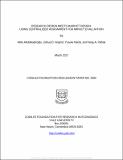Research Design Meets Market Design: Using Centralized Assignment for Impact Evaluation
Author(s)
Abdulkadiroğlu, Atila; Angrist, Joshua; Narita, Yusuke; Pathak, Parag
DownloadSSRN-id2928326.pdf (1021.Kb)
OPEN_ACCESS_POLICY
Open Access Policy
Creative Commons Attribution-Noncommercial-Share Alike
Terms of use
Metadata
Show full item recordAbstract
A growing number of school districts use centralized assignment mechanisms to allocate school seats in a manner that reflects student preferences and school priorities. Many of these assignment schemes use lotteries to ration seats when schools are oversubscribed. The resulting random assignment opens the door to credible quasi-experimental research designs for the evaluation of school effectiveness. Yet the question of how best to separate the lottery-generated randomization integral to such designs from non-random preferences and priorities remains open. This paper develops easily-implemented empirical strategies that fully exploit the random assignment embedded in a wide class of mechanisms, while also revealing why seats are randomized at one school but not another. We use these methods to evaluate charter schools in Denver, one of a growing number of districts that combine charter and traditional public schools in a unified assignment system. The resulting estimates show large achievement gains from charter school attendance. Our approach generates efficiency gains over ad hoc methods, such as those that focus on schools ranked first, while also identifying a more representative average causal effect. We also show how to use centralized assignment mechanisms to identify causal effects in models with multiple school sectors.
Date issued
2017-09Department
Massachusetts Institute of Technology. Department of EconomicsJournal
Econometrica
Publisher
The Econometric Society
Citation
Abdulkadiroğlu, Atila et al. “Research Design Meets Market Design: Using Centralized Assignment for Impact Evaluation.” Econometrica 85, 5 (2017): 1373–1432 © 2017 The Econometric Society
Version: Original manuscript
ISSN
0012-9682
1468-0262